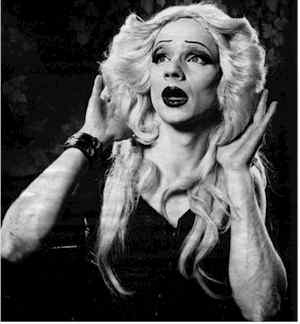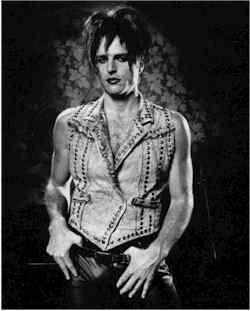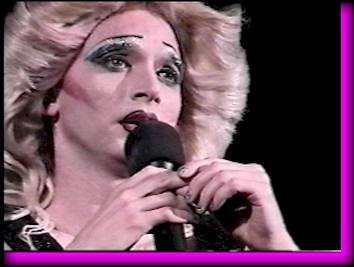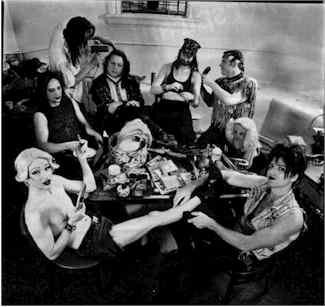
(Bio/ interviews)
 |
|||||
| Lobby | On the Record | Stage | Stage Door (Bio/ interviews) |
Backstage |
Sex & Drag & Rock & Roll
"Hedwig & the Angry Inch is the first rock musical that truly rocks"
Rolling Stone, December 10, 1998
by David Fricke
photos by Amy Arbus

She makes her entrance like a star dying to be born - goose-stepping through the audience
with the arrogant aplomb of Marlene Dietrich and Jim Morrison; decked out like a
trailer-park tart's idea of a glam-rock fox, in stone-washed denim, an Aryan-yellow,
blow-dried mane and red-glitter lipstick; accompanied by the refried-Queen strains of
"America the Beautiful" and a marvelously surly introduction by her crusty
Serbian valet boy toy, Yitzak: "Ladies and gentlemen, whether you like it or not-
Hedwig!"
right: John Cameron Mitchell as Hedwig
Then the former Hansel Schmidt - now Hedwig, a Yankee Doodle dahling of muddled gender,
thanks to a botched 1988 sex-change operation in her native East Berlin - takes the stage
and dares you not to accept her as your new, true rock & roll queen. "I was born
on the other side/Of a town ripped in two," she belts through the power-chord
fireworks and girl-group whoops of her opening number, "Tear Me Down." "I
made it over the great divide/Now I'm coming for you."
For ninety minutes, backed by her sullen but kickbutt band, the Angry Inch, Hedwig presses
her case for coronation, telling her life story in pun and song like a way-off-Broadway
hybrid of Sandra Bernhard, Nina Hagen and Courtney Love. Hedwig relates in hilarious
detail a grim socialist childhood (listening to armed-forces radio, head in the oven for
privacy); her predatory seduction by an American Gl and a messy switch from he to sort-of
she ("Six inches forward and five inches back/l got an angry inch"); the working
life of a transsexual divorcee in Junction City Kansas ("the jobs we call
blow"); and love and collaboration with a teenage dork named Tommy Speck, whom she
remakes as rock god Tommy Gnosis only to be betrayed and ditched as he goes big time.
And there are the tunes: an LP's worth of oughtabe hitsville, including the
sweet-and-sour, Lou Reed style melancholy of "The Origin of Love," the buoyant
personal-makeover march "Wig in a Box" (Meat Loaf meets the Shirelles) and the
raw-power discontent of "Exquisite Corpse," Hedwig's climactic rebellion against
her physical and emotional mutilation. When she brings the night to a close with
"Midnight Radio," a luminous tribute to the healing powers of rock & roll,
Hedwig hits the pop-operatic heights of David Bowie's Ziggy Starlust aria, "Rock
& Roll Suicide" - but with the emphasis on survival. As she declares in the
middle of the song, saluting her heroines and inspirations, "Here's to Patti and Tina
and Yoko/ Aretha and Nona and Nico/And me."
It is an evening of spirit, wit and crunch worthy of Madison Square Garden - that is, if
there really were a Hedwig. She is actually a brilliant work of fiction, the creation of
actor-writer John Cameron Mitchell and composer-lyricist Stephen Trask, and she is the
centerpiece of their dynamite one-act theater piece,
Hedwig and the Angry Inch. Since opening last
Valentine's Day at the tiny Jane Street Theater in lower Manhattan, Hedwig - with Mitchell
in kinetic drag as Hedwig; Trask and his real-life band, Cheater, as the Angry Inch; and
Miriam Shor in reverse drag as the grumpy Yitzak - has been getting rave reviews and
playing to ecstatic houses. An original-cast album is due shortly on Atlantic Records, and
Mitchell and Trask have signed with New Line Cinema to put Hedwig on the big screen.
All this good fortune is for good reason, too. In the whole long, sorry history of rock
musicals, Hedwig and the Angry Inch is the first one that truly rocks.
"It's really gratifying to see young punks and people who are more staid all enjoying
it at the same time," says Mitchell, 35, whose audiences this year have included bona
fide rock stars like Lou Reed, David Bowie, Pete Townshend and former Husker Du
singer-guitarist Bob Mould. "The older people think, 'Oh, I didn't know rock &
roll could be intelligent.' And the kids say, 'I didn't think theater could rock &
roll.' "

left : Stephen Trask
"What amazes me is that a theater critic will talk about the blocking of a
scene," says Trask, 32, "and a rock critic will notice LaVern Baker the great
R&B songstress gets a name check in "Wig in a Box"]. But the overall effect
seems to be the same on everybody. Rock people like myself - we like the idea of theater
and rock & roll mixing together. Young actors who are professional and sing in
musicals are saying, 'I can't believe someone did this.' "
And, Trask notes, "for under-forty gay men who grew up with rock rather than Marilyn
Monroe, it's exciting to know that this comes from your culture."
As a rock musical, Hedwig was born a million miles away from the Broadway sugar of Rent
and Tommy as part of a female-impersonator revue at Squeezebox, a club on
Greenwich Street where Mitchell, an on and off-Broadway veteran and a regular on the short
lived sitcom Party Girl, debuted as Hedwig in 1994. At Squeezebox, Trask was the
house-band leader and the specialty was rock-goddess drag - Tina Turner, Patti Smith,
Deborah Harry - instead of stereotypical Barbra Streisand and Judy Garland routines.
Mitchell's brassy, gender-bent invention fit right in. His early Hedwig repertoire was a
bold mix of covers: "Half-Breed," by Cher, Television's "See No Evil,"
Yoko Ono's "Death of Samantha" and "Non-Alignment Pact" by Pere Ubu.
At Squeezebox and later in other downtown clubs and theater spaces, Mitchell, Trask and
Cheater guitarist Chris Weilding, bassist Scott Bilbrey and drummer Dave McKinley -
developed Hedwig's diva potential. Mitchell wrote a story rife with double-entendres and
rock-biz jokes ("We're talking to Phil Collins' people, but then again, aren't we
all?"). His script was also grounded in autobiography: Hedwig is based on a German
emigre and prostitute, Helga, who had been a babysitter for Mitchell's family in Junction
City. And like Tommy Speck/ Gnosis, Mitchell was an Army general's son with a strict
Catholic upbringing.
Equally versed in Cole Porter and the Pixies, Trask - Connecticut-born, with a background
in modern dance and movie scoring - wrote new songs that literally amplified Mitchell's
themes of sexual confusion and identity crisis. "Exquisite Corpse" was, Trask
says, his idea of Hedwig doing "a Sleater-Kinney or Courtney Love kind of song."
"The Origin of Love" was inspired by Mitchell's idea for a song based on the
concept in Plato's Symposium of love as the eternal pursuit of a missing half, that
physical or emotional component without which one feels incomplete, less than whole.
 Michael Cerveris, who was the original lead in the Broadway Tommy
and who recently played Hedwig for a month while Mitchell took a summer break, says that
amid the gags and riffs, Hedwig "totally gets your guard down and sucker-punches you
with this story - that search for your other half, whatever or whoever that is. And also
that feeling of not fitting in, of being the odd person out."
Michael Cerveris, who was the original lead in the Broadway Tommy
and who recently played Hedwig for a month while Mitchell took a summer break, says that
amid the gags and riffs, Hedwig "totally gets your guard down and sucker-punches you
with this story - that search for your other half, whatever or whoever that is. And also
that feeling of not fitting in, of being the odd person out."
Yet, Cerveris adds, "as fucked up as she is and as tragic as she is, Hedwig is
totally a survivor. And even though she comes in as this kind of monster, it's not a
monster you don't know in yourself."
left: Michael as Hedwig
Surprisingly slender and soft-spoken when he's not in costume, Mitchell admits that Hedwig
is, in part, "a big 'fuck you' to a lot of people who were dictating what theater
should be. Though I don't think of this as any kind of gay tract. I really want as many
people as possible to relate to something, without compromising or dumbing down. I've
always liked a good joke that everybody can laugh at."
For two guys flipping the bird at mainstream musicals, Mitchell and Trask met in a very
Broadway-fantasy manner: by happen stance, on a plane. "We were the only two guys not
watching the in-flight movie," Trask remembers, grinning. They struck up a
conversation and discussed their respective careers in rock and theater. Later on in New
York, as they started hanging out, the pair talked about a story Mitchell was writing
about Tommy Gnosis (gnosis is the Greek word for truth).
"I would tell Stephen stories about my life that were informing the work that I had
already done on the Tommy character," Mitchell says. "And he would tell me what
he found interesting and would encourage me to follow those things." Trask suggested
pursuing the dramatic possibilities of Helga.
"She was a German army wife," Mitchell recalls. "She had that world weary
thing, which was very impressive. But it's like when you meet immigrants here - there's a
hope and determination. And she was fun. Me and my friend Brenda, who lived next door,
we'd sing a lot of songs for
her and act them out, like 'Copacabana' and 'Lyin' Eyes.' She would be tickled by that.
She'd give us drinks in her trailer.
"Tommy is a lot closer to me. But I don't like autobiographical shows, actors who
can't get work so they do therapy onstage. The mask of Hedwig - it's fun to leap into
something. The specifics of
her life are quite different from mine. But the emotional imperatives are mine."
Mitchell points out that the name Hedwig comes from a character in Henrik Ibsen's play The
Wild Duck: "She's the girl who's destroyed by too much honesty."
In writing and staging Hedwig, Trask and Mitchell - coming from very different disciplines
- often had trouble finding common ground. "We were working on 'Exquisite Corpse,'
" Trask says, "and that is very much a rock song, no narrative in it at all,
just a relentless statement of feeling. And John is like, 'What is my motivation for this
part?' I'm like, 'I don't know. You like it?' To me, I write a neat song, I get up
onstage, sing it and hope other people think it's a good song. He needed a
motivation."
Mitchell, in turn, claims that Trask could be defensive about his music: "I come from
the theater
and there is a real collaborative history there. He was very proprietary about getting
comments about his lyrics. They're so personal to him. At the same time, I was a new
writer, so I'm sure I was very proprietary about sentence construction."

After a one-month run in 1997 at the small Westbeth Theater, in Greenwich Village, Hedwig and the Angry Inch
was ready for more permanent digs. But the combination of subject matter and loud music
scared off theater owners. "Nobody would have us," says Trask. The show's
producers ended up spending $100,000 - a third of Hedwig's initial production costs -
creating the Jane Street Theater out of an empty ground-floor space in the old Hotel
Riverview, a pre-World War I relic that once housed surviving crew members of the Titanic
(and, in the Eighties, featured a great New York punk club, the Rock Hotel).
Backstage at Hedwig, clockwise from bottom left: Mitchell in
mid-costume change, bassist Scott Bilbrey, wig designer Mike Potter, guitarist Chris
Weilding, Shor as Yitsak, drummer David McKinley and Trask.
Then, a week before Hedwig's Jane Street bow, Mitchell and Trask were refused permission
to use their closing number, a cover of the Debby Boone hit "You Light up My
Life," by the song's composer, Joe Brooks. "We did it in German," Trask
explains. "It started off like a Brecht-Weill thing and worked up into this Burt
Bacharach thing. For the last chorus, we turned it into a huge Queen stadium rocker."
Brooks eventually relented, but it was too late. Trask had written "Midnight
Radio" in an inspired five-day panic.
"I had to write something to bring the house down," Trask says. "We wanted
all of Hedwig's story and emotion to go into the song, to send it up but also to pay
tribute to the audience and to Hedwig."
Hedwig's success at the Jane Street Theater has now brought Mitchell and Trask to an
awkward crossroad: how to go wide with a winning piece of rock & roll theater - on
record, in a movie, in touring companies - without losing the intimate razzle and
high-decibel dazzle of the original production and cast. Mitchell is leaving the show in
January to concentrate on writing a Hedwig film script. (Michael Cerveris is in
negotiations to rejoin the cast.) Trask is torn between bigger Hedwig payoffs - he's
already been approached by the Broadway establishment about writing another musical - and
his hopes for a recording career with Cheater. "The next thing," Trask declares,
"is for us to work on establishing the band's identity."
Meanwhile, Hedwig - the woman, the singer, the legend in her own mind - is on a roll,
eager to run riot with her newfound stardom. "The second album, of course, would be
about dealing with her fame," Mitchell suggests with a devilish smile. "There
would be a song about rock critics, about how fucked up the record companies are, fans
wanting too much." His tentative plans for the movie treatment include a climactic
concert at the opening of a TGI Friday's restaurant - next to Madison Square Garden.
"I'm just ready to go off," Mitchell says eagerly. "There's nothing sacred
about this text."
Trask figures that Hedwig will end up on Broadway "at some point in my life," he
cracks with a hopeful laugh. "But I have this image - you know those laserlight shows
with the Pink Floyd music? I was thinking of an annual Hedwig summer tour of planetariums. I
could just imagine all these high school kids smoking a lot of dope, drinking malt liquor,
vomiting in the parking lot and seeing Hedwig."